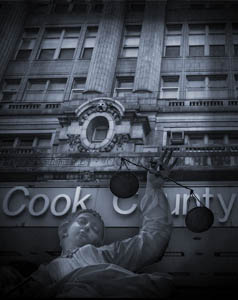Chicago – The Cook County State’s Attorney’s Office argues in recent court documents that Northwestern University undergraduate journalism students acted as criminal investigators and are not reporters, and the office states that students paid witnesses in their investigation of Anthony McKinney. Northwestern investigative journalism professor David Protess argues against the state’s attorney’s allegations, though.
Students, under the direction of Protess, gain firsthand experience in investigating wrongful murder convictions as part of the Medill Innocence Project. This particular case revolves around McKinney, who was convicted of shooting and killing Donald Lundahl, a security guard, in 1978.
Convicted killer and armed robber Tony Drake had told students in a 2004 videotaped statement that he was present when the murder occurred and that McKinney was innocent.
The state’s attorney’s office’s investigation, though, concluded that it found variations in witness accounts that reveal credibility issues, and the office states that Drake gave students a video statement for money. It states that the team of students told Drake that they would not pay for a statement but that later a student flashed a wad of cash toward Drake; that students gave $60 to a cab driver to drive Drake to a bus station; that Drake got money indirectly from a cab driver called and paid by the team of students; that Drake bought crack cocaine with the change he got from the cab driver, and that when Drake talked to the state’s attorney’s office, he recanted his video statement.
When Drake recanted, he was interviewed in prison by two prosecutors and a state’s attorney’s investigator.
According to state’s attorney’s office documents, Drake “gave his video statement upon the understanding that he would receive cash if he gave the answers that inculpated himself and that Drake promptly used the money to purchase crack cocaine.”
However, Protess said, “Even though (Drake) stated on the videotape that he had not received any compensation for talking with my students, Drake told the trio from the state’s attorney’s office that he’d been paid $100. Yet, the state’s evidence of the alleged payment was a $60 cab fare given to the driver, for which we have a receipt. When prosecutors asked Drake about being paid for the interview, here’s how he responded, according to their own report: “… he said the students told him they could not give him money for an interview.”
Still, the state’s attorney’s office states, “This video statement remains an integral part of McKinney’s innocence petition” and “The state has a duty to determine whether the money given to the cab driver and then to Tony Drake was given in exchange for Drake’s affidavit. The state needs to determine whether an essential witness’s drug addiction or need for cash was a motive to sign his affidavit.”
Also, the state’s attorney’s office contends that students have turned over only selected materials; the office argues that all materials relevant to guilt or innocence should be turned over and not just those that the school considers important or helpful to its goals. The office contends that students “had to provide a product and get results to graduate” and therefore “all the team’s notes, memos, binders, records or statements are relevant and subject to disclosure.” The office argues that “the basis for determining grades in the class is unknown and may be relevant to bias, motive or interest.”
Although the state’s attorney’s office argues that witnesses who allegedly witnessed the same event have provided inconsistent accounts of the time, place and other details about the murder, Protess said, “Anthony McKinney’s lawyers have filed seven affidavits from our sources indicating that Drake confessed the Lundahl murder to them. There is no reference to this corroborative evidence in the state’s attorney’s office’s report.”
Also, Protess said, “Except for Tony Drake’s claims, no witness offered any evidence that my student-journalists paid for interviews, while two witnesses said they were paid by law enforcement. And, in the case of Tony Drake, state’s attorney’s office investigators acknowledged Drake was specifically told by the students that ‘they could not give him money for an interview.'”
The issue of money also was raised with Robert McGruder, who was named by Tony Drake as an alternative suspect in the crime. “In response to questioning by a state’s attorney’s office investigator, McGruder did not claim that Medill students paid him at any point for their two interviews,” Protess said. “However, McGruder did report that the lead detectives in the McKinney case paid him $30 to $40. When asked to explain, McGruder said it was their way of apologizing ‘for hitting him in the police station.'”
Talking about the credibility of Tony Drake, Protess said, “Why would law enforcement officers believe a convicted killer’s account over my student-journalists’ “unless their motivation was to discredit the students and to direct attention away from the powerful evidence of Anthony McKinney’s innocence?”
“Moreover, in view of the filing, it seems the state has undermined its own legal position on the subpoena by acknowledging they have live witnesses who are available to impeach the evidence we tendered to them. So why do they need our notes and grades? Let their witnesses take the stand, and let the truth be known.”
Join us in defending the truth before it’s too late
The future of independent journalism is uncertain, and the consequences of losing it are too grave to ignore. To ensure Truthout remains safe, strong, and free, we need to raise $29,000 in the next 36 hours. Every dollar raised goes directly toward the costs of producing news you can trust.
Please give what you can — because by supporting us with a tax-deductible donation, you’re not just preserving a source of news, you’re helping to safeguard what’s left of our democracy.
